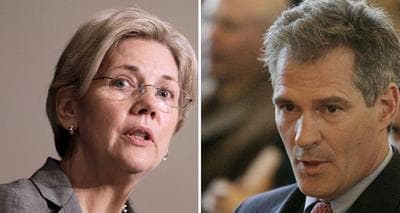Advertisement
Brown, Warren To Discuss Ending Third-Party Attack Ads
Resume
Sen. Scott Brown and Democratic hopeful Elizabeth Warren have both been the target of third-party attack ads. This week, Brown and Warren have been corresponding to try and figure out a way to make them stop.
In an email to Brown on Friday, Warren proposed an "enforceable agreement" to end third-party ads, and the campaigns have agreed to meet to discuss the issue.
But what power do candidates have over independent groups that are, by their very nature, supposed to be independent?
"The whole point of the super PACs - the thing that makes them legal - is that they operate independently of the candidates," said Richard Briffault, a law professor and expert in campaign finance law at Columbia Law School. "So to suggest that the candidates could actually control the super PACs that are helping them would in effect mean that those super PACs were themselves illegal."
That doesn't mean Brown and Warren couldn't strongly and publicly denounce the third-party ads together. Briffault said a message like that would likely have an effect on the types of super PACs that are playing a prominent roll in the race for the Republican presidential nomination - super PACs that are strongly identified with one candidate, for instance, the pro-Mitt Romney super PAC Restore Our Future, and the pro-Newt Gingrich super PAC, Winning Our Future.
"My guess is that those super PACs would listen to what those candidates are saying," Briffault said. "On the other hand, other super PACs are out there and have a broader agenda. And they may be working to help a particular party across the board. And it could be that a super PAC that is really interested in making sure that the Republicans or the Democrats control the Senate after this year's elections - they might go ahead and spend anyway."
Guest:
- Richard Briffault, Joseph P. Chamberlain Professor of Legislation, Columbia Law School
This program aired on January 17, 2012.